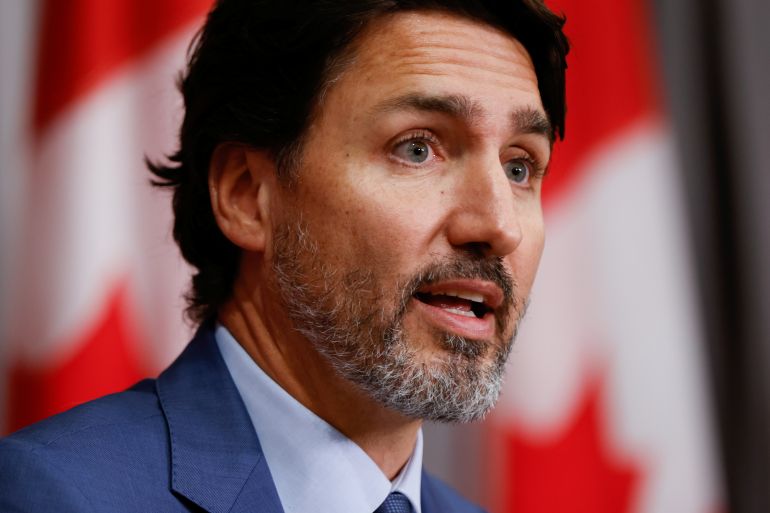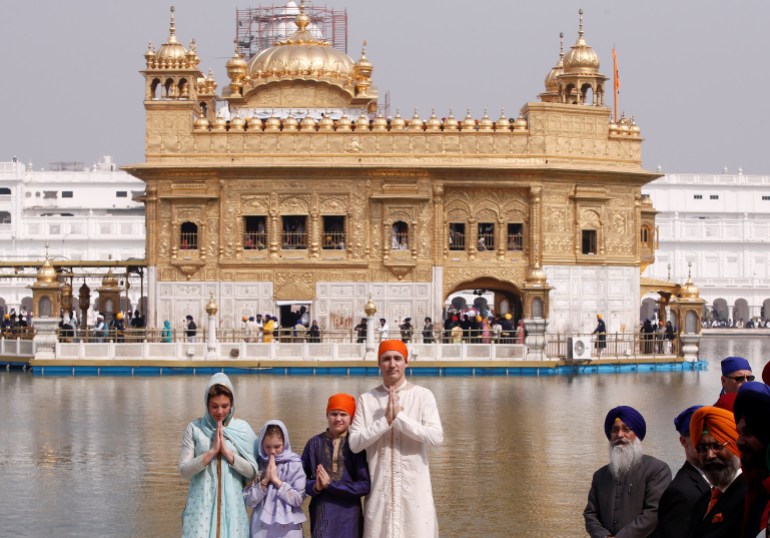‘Unwarranted’: India slams Canada PM’s remarks on farmer protests
India accuses Justin Trudeau of interfering in its internal affairs after Canadian Prime Minister commented on the ongoing farmers’ protests.

New Delhi, India – Canadian Prime Minister Justin Trudeau’s remarks on the continuing farmers’ protests in India has not gone down well with the Hindu nationalist government, which dubbed his comments as “unwarranted”.
“We have seen some ill-informed comments by Canadian leaders relating to farmers in India. Such comments are unwarranted, especially when pertaining to the internal affairs of a democratic country,” India’s Ministry of External Affairs (MEA) spokesperson Anurag Srivastava said on Tuesday.
Keep reading
list of 4 itemsHow will Indian PM Narendra Modi deal with angry farmers?
India farmers brave tear gas as they protest against ‘black laws’
What is behind India’s ‘love jihad’ legislation?
“It is also best that diplomatic conversations are not misrepresented for political purposes.”
Speaking at an online event to mark the 551st birth anniversary of Guru Nanak, the founder of Sikhism, the Canadian leader said that the news coming out of India was “concerning” and his country would “always be there to defend the rights of peaceful protest”.
Thousands of farmers have been camping outside the Indian capital, New Delhi, for almost a week now, demanding the scrapping of controversial agriculture laws enacted by the governing Bharatiya Janata Party (BJP).
In the global family of our planet, it is always encouraging when world leaders speak up for the citizens' right to protest. #JustinTrudeau https://t.co/MLlxk9YP5J
— Sagarika Ghose (@sagarikaghose) December 1, 2020
The government of Prime Minister Narendra Modi defended the laws and accused the opposition parties of misleading the farmers, who have dubbed the bills “anti-farmer”. His government says the new laws will bring much-needed private investment to the crisis-hit agricultural sector.
Dwindling farm income
Over the past several decades the share of agriculture in the country’s gross domestic product (GDP) has dwindled as the farm sector has been hit with high indebtedness, crop failure, drought and low prices for produce. The sector accounts for 15 percent of the economy but employs more than half of the country’s 1.3 billion people.
Farmers fear that the minimum support price (MSP) – the price at which the government buys farm produce – will be abolished gradually and they will be left at the mercy of private players.
Has @JustinTrudeau “expressed concern” about the peaceful protests in Hong Kong? Thailand? Poland? France? Bangladesh? And the many countries which have seen protests in the last few weeks? Or is he interested in defending the rights of only politically relevant groups?
— Palki Sharma (@palkisu) December 1, 2020
A number of politicians from the United Kingdom, Canada, Australia and the United States have expressed their solidarity with Indian farmers over the past few days and criticised the Modi government’s handling of the biggest protests in years.

But Trudeau became the first head of a country to comment on the issue that has set the Modi government on the back foot.
On Tuesday, #Canada was trending on Twitter as Indians shared their views on social media in the wake of Trudeau’s comments.
“He is not responsible for law and order in our country. It’s something which the government of the day has to take care of and the government is taking care of everything and engaging the farmers,” BJP Spokesperson Syed Zafar Islam told Al Jazeera.
A spokesperson of the Shiv Sena party, which governs the western state of Maharashtra, said “India’s internal issue is not fodder for another nation’s politics”.
“Please respect the courtesies that we always extend to other nations,” Priyanka Chaturvedi said on Trudeau’s comments.
Sikh minority in Canada
Canada is home to a large number of Indian immigrants, mostly from India’s Punjab state where most of the current protesters have farms. Trudeau has been hailed for his pro-immigrant policy. He has inducted four Indian-origin ministers into his cabinet, three of whom are from the Sikh minority community.
Indian politicians have accused Canadian leaders, including current Defence Minister Harjit Sajjan, of having links with Khalistani groups – who are believed to have been behind an armed rebellion in the state of Punjab during the 1980s for a separate Sikh state. Sajjan denied the allegations.
Since #JustinTrudeau supported farmers-
Bhakts- It is for Sikh votes.
OpIndia- Trudeau has Khalistani connections
MEA spox- It is our internal affair.Conclusion- Without introspection, attack whoever criticises, with full force.
— Anu Mittal (@stylistanu) December 1, 2020
The Khalistani issue cast a shadow over Trudeau’s 2018 visit to India during which the Canadian prime minister was snubbed by the Modi government, which has been known for its strident anti-immigrant and anti-Muslim policies.
“Trudeau has a big NRI (non-resident Indian) constituency with several Sikh ministers. I think he is also talking to them and he is seeing the farmers protest as a human rights problem. Human rights problems always have an international dimension,” said Shiv Visvanathan, an author and social scientist.

“Trudeau will always love to cater to the Indian constituency that is his voting bloc. Every time he raises it, he gets plus points. It gives him an image of a human rights activist. It shows his concerns for his Indian constituency and also shows an immediate awareness to his constituents that he knows what is going on in India at this stage.”
Journalist and political commentator Paranjoy Guha Thakurta backed the Canadian prime minister.
“Just because he is the head of the government of Canada doesn’t mean that what he is saying is incorrect and it’s also incidental that large numbers of immigrants from Punjab have settled down in Canada. What Trudeau is saying that you should respect, in a democracy, the right of individuals to protest in a public space,” he said.
If the Modi government had “respected the wishes of the farmers, had not rushed through the enactment of these three farm laws in parliament, without adequate consultation with different stakeholders, they wouldn’t be in the mess they are at present,” Thakurta said.